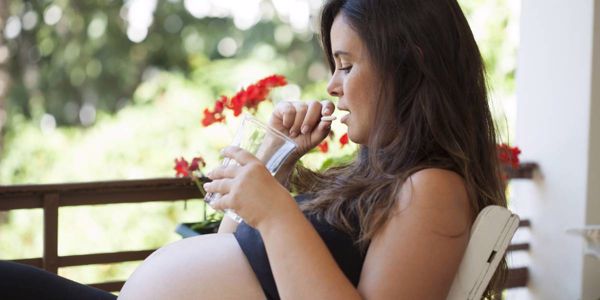As per my latest post on supplementation during pregnancy the following advice on supplementation is still applicable for vegetarians and vegans:
- 400mcg folic acid during the first 12 weeks of pregnancy to prevent to risk of spina bifida and other neural tube defects.
- 10mcg of vitamin D during all of pregnancy.
- Avoid supplements containing vitamin A and liver/liver products & fish oils.
However, there are also additional nutrients you have to be extra cautious about.
Iodine
- Iodine is needed for brain development.
- Often low amounts are found in plant foods and the amount varies depending on soil concentrations. Seaweed can be a good source but some types can be too high. Some plant milk may have potassium iodide added.
- The World Health Organisation recommends a higher intake of 250mcg per day for pregnancy and breastfeeding in countries where salt is not routinely iodised (this includes the UK)
- The Vegan Society recommends topping up your dietary intake with a non-seaweed supplement to be considered during pregnancy.
Vitamin B12
- A lack of intake during pregnancy & breastfeeding can cause complications.
- Vitamin B12 is not produced by plants so fortified foods are the only source for Vegans.
- Consider fortified products including non-dairy alternatives, yeast extracts, vegan spreads & some breakfast cereals.
- Aim to have these foods twice daily or consider a supplement (10mcg daily or 2000mcg weekly). This intake may seem higher but your body absorbs B12 more efficiently in small frequent amounts.
- No upper limits have been set for Vitamin B12 as no toxic effects have been identified.
Iron
- A lack of iron can cause tiredness and anaemia.
- Vegan sources of iron including lentils, chickpeas, beans, tofu, seeds (chia, linseed, hemp, pumpkin) dried apricots, figs and raisons, fortified breakfast cereals. These foods can also be good sources of protein and zinc, in pregnancy an extra 6g of protein per day is recommended.
- To help absorb iron from meals, consume vitamin C with meals (e.g. peppers, broccoli, tomatoes, fruit juice, strawberries are good sources) and avoid drinking tea/coffee with your meal as that can reduce the absorption of iron from food.
Calcium & Vitamin D
- Calcium is important for all ages for strong bones and teeth. Breastfeeding mums have higher calcium requirements and if you are following a vegan diet you need to be extra cautious about your food intake.
- The recommended intake for breastfeeding is nearly double that for the general population! (1250mg per day compared to 700mg per day in pregnancy)
- Aim to include lots of dairy alternatives (plant-based yoghurts, milk, cheese) but make sure these are calcium enriched/fortified. Other good sources are tofu (if set with calcium), nuts, seeds and green leafy veg.
- Some ideas can include:
- A fortified breakfast cereal with 1tbsp chia seeds and 200ml calcium-fortified plant milk.
- A meal with tofu, nuts, broccoli, kale & okra.
- Snacks with dried figs & almonds.
- 200ml glass of calcium-fortified plant milk
- If you feel you are not getting enough calcium through your diet, you may need to take a supplement. Follow this link for more information on calcium: https://www.bda.uk.com/resource/calcium.html.
- Vitamin D is needed for the absorption of calcium from foods. All pregnant and breastfeeding mums need to take Vitamin D daily (10micrograms) Vitamin D3 from lichen and Vitamin D2 are vegan-friendly.
Omega 3 fats
- Needed for the health of our brain, heart, vision and immune function and also your baby's brain, nerves and eyes.
- Sources include ground linseeds, chia or hemp seeds, walnuts and rapeseed oil. Aim to include these foods daily. To get enough of the essential Omega 3 fat you would need to eat the equivalent of 1 tbsp ground linseed or chia seeds, 2tbsp hemp seeds or 6 walnut halves.
- Choose vegetable (rapeseed) oil instead of oils containing a lot of omega 6 fat (such as sunflower, corn or sesame oil) as too much omega 6 can make it harder for your body to convert and use the omega 3 fat.
- If following a vegan diet and pregnant or breastfeeding you may want to consider taking an algae EPA/DHA supplement. If you choose to supplement do not take one containing vitamin A if you are pregnant. Aim for 450mg EPA & DHA per daily adult dose.
Zinc
- Zinc plays a role in making your baby’s cells and DNA during pregnancy. It also supports the development of your baby as they grow whilst you are breastfeeding them.
- During breastfeeding, you will need a little more zinc than pregnancy (13mg per day rather than 7mg during breastfeeding).
- Eating beans, chickpeas, lentils, tofu, chia seeds, linseeds, hemp and pumpkin seeds and quinoa are all good sources of zinc.
In summary:
- 400mcg folic acid when trying for a baby and during the first 12 weeks of pregnancy
- 10mcg of vitamin D during all of pregnancy.
- Consider an iodine non-seaweed supplement during pregnancy.
- Consider a vitamin B12 supplement (10mcg daily or 2000mcg weekly).
- You may want to consider taking an algae EPA/SHA omega 3 supplement (450mg EPA & DHA per daily adult dose).
- Avoid supplements containing vitamin A and liver/liver products & fish oils.
For more general information on vegan nutrition – see The Vegan Society website for more information on your overall diet https://www.vegansociety.com/
It can seem very daunting and confusing with so many different nutrients to consider, however, some vegan supplements can contain most of the above nutrients in one table, just make sure they have no vitamin A in. If you need extra advice regarding supplementation, speak with your doctor or a registered dietitian.
Articles shown are a mixture of informative pieces, anecdotal accounts and professional advice from our panel of Bloggers, Writers and Experts. The views and opinions expressed in these articles are those of the authors and do not necessarily reflect the official view of this site.






